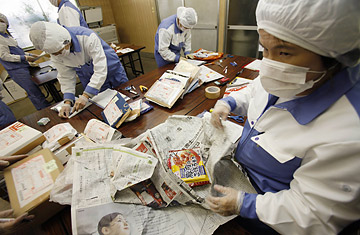
Masked workers of JT Foods Co., check packs of frozen foods recalled at Sakai town in Ibaraki Prefecture, near Tokyo, Japan.
Bite-sized potstickers are popular in Japan, but rarely are they food for political debate. Since December, frozen gyoza (meat dumplings) produced by Chinese manufacturer Tianyang Food Processing Ltd. have caused at least 10 people to become ill due to contamination by a potentially lethal insecticide. The poisonings have fueled not only mounting suspicion of Chinese food products but also a political kitchen fire that threatens to singe relations between the two countries.
The food poisonings were announced on Jan. 30 by Japan's Health, Labor and Welfare Ministry, a month after the first case was reported to a prefectural government. Ten people fell ill in Chiba and Hyogo prefectures during December and January and according to the Health Ministry, 3,742 people have contacted health officials with inquiries or reports of illness after eating gyoza. The initial 10 cases, however, are the only ones confirmed to be caused by ingesting the pesticide, methamidophos, which is not allowed in Japan and was banned in China at the beginning of this year.
JT Foods, an affiliate of Japan Tobacco, imported the Chinese-produced dumplings and has since voluntarily recalled the products from supermarket shelves. Japan Tobacco has posted an apology on its homepage and has called off a proposed merger with Nissin Food Products, a deal that would have created the industry's largest frozen-food importer. The government has listed 18 additional companies that have dealt with Tianyang Food and is discouraging the sale of its products.
The food scandal could also poison historically strained ties between China and Japan. Colder than a frozen gyoza during the tenure of Prime Minister Junichiro Koizumi, thanks to his insistence on visiting the controversial Yasukuni shrine honoring Japan's war dead, relations have thawed over the last year and a half. Koizumi's successors, the short-lived Shinzo Abe and current leader Yasuo Fukuda, have worked to strengthen and stabilize relations, in part because of Japan's increasing economic dependence on trade with China. So far, the two countries are keeping their cool and agreed Wednesday to continue cooperating to find the cause of the poisonings. Fukuda, still smarting from a slew of controversies over mislabeled food last year, pledged in mid-January to focus his attention on the interests of consumers. Former Foreign Minister Taro Aso suggested, somewhat flippantly, that Japanese thank China, noting that the scare over foreign foodstuffs added value to local agricultural products. A Japanese fact-finding mission met with Chinese quality control officials in Beijing on Tuesday before conducting its own investigations, including a visit to the Tianyang Food factory in Hebei Province. As of Wednesday, the mission found no problems at the factory that might suggest it as the origin of the tainted gyoza.
China's reaction has also been conciliatory, possibly to avoid any more damaging product-quality scandals — like last year's outcry over lead-contaminated toy exports — in the run-up to the 2008 Beijing Olympics. "If this incident turns into an international dispute, the image for the Olympic Games is going to be bad," says Toshimitsu Shigemura, an international relations professor at Waseda University. "If Chinese food is dangerous and people think of China as unsafe, it will be a severe issue for them." On Sunday, China sent five food safety and quality control officials to Tokyo to join a bilateral investigation into the poisonings. But while Beijing tries to soothe Japanese consumer anxiety, Japanese Health Minister Yoichi Masuzoe said Tuesday that he suspects the poisonings could have been deliberate; police are now treating the cases as attempted murder. "Since the origin of the incident came from China, the Chinese need to work out some sort of conclusion to this," says Shigemura. "The Japanese don't trust China right now — and they expect some resolution."
Starting last Thursday, restaurants and supermarkets began pulling Chinese-made foodstuffs from their shelves. Skylark Co., which owns the restaurant chains Bamiyan and Gusto, suspended the use of products processed in China at its 4,145 outlets across Japan — even though none of them came from Tianyang Food. On Tuesday, Chief Cabinet Secretary Nobutaka Machimura said that 606 public schools used food from Tianyang Food in lunches, although no children have fallen ill. Education boards around the country have been asked to refrain from serving food produced by the company.
But keeping schools, restaurants and supermarkets free of Chinese-produced food is nearly impossible: China is the second-largest provider of food imports after the U.S., and frozen products from China account for more than half of all those imported to Japan. Rather than sacrifice their hunger for dumplings, Japanese prepared to make their own from scratch are grabbing up gyoza no kawa — premade gyoza wrappers — faster than supermarkets can stock them. Some supermarkets are raising the cost of minced meat as demand soars, while sales of frozen foods are plunging, with some stores slashing prices up to 30%. And to whatever extent possible, consumers are scrutinizing labels to ensure that what they buy is not produced in China.
